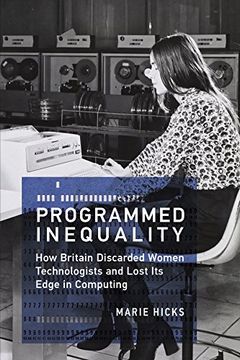Compartir
Programmed Inequality: How Britain Discarded Women Technologists and Lost its Edge in Computing (History of Computing)
Marie Hicks (Autor)
·
The Mit Press
· Tapa Blanda
Programmed Inequality: How Britain Discarded Women Technologists and Lost its Edge in Computing (History of Computing) - Marie Hicks
Sin Stock
Te enviaremos un correo cuando el libro vuelva a estar disponible
Reseña del libro "Programmed Inequality: How Britain Discarded Women Technologists and Lost its Edge in Computing (History of Computing)"
How Britain lost its early dominance in computing by systematically discriminating against its most qualified workers: women.In 1944, Britain led the world in electronic computing. By 1974, the British computer industry was all but extinct. What happened in the intervening thirty years holds lessons for all postindustrial superpowers. As Britain struggled to use technology to retain its global power, the nation's inability to manage its technical labor force hobbled its transition into the information age. In Programmed Inequality, Marie Hicks explores the story of labor feminization and gendered technocracy that undercut British efforts to computerize. That failure sprang from the government's systematic neglect of its largest trained technical workforce simply because they were women. Women were a hidden engine of growth in high technology from World War II to the 1960s. As computing experienced a gender flip, becoming male-identified in the 1960s and 1970s, labor problems grew into structural ones and gender discrimination caused the nation's largest computer user―the civil service and sprawling public sector―to make decisions that were disastrous for the British computer industry and the nation as a whole.Drawing on recently opened government files, personal interviews, and the archives of major British computer companies, Programmed Inequality takes aim at the fiction of technological meritocracy. Hicks explains why, even today, possessing technical skill is not enough to ensure that women will rise to the top in science and technology fields. Programmed Inequality shows how the disappearance of women from the field had grave macroeconomic consequences for Britain, and why the United States risks repeating those errors in the twenty-first century.
- 0% (0)
- 0% (0)
- 0% (0)
- 0% (0)
- 0% (0)
Respuesta:
Todos los libros de nuestro catálogo son Originales.
Respuesta:
El libro está escrito en Inglés.
Respuesta:
La encuadernación de esta edición es Tapa Blanda.
✓ Producto agregado correctamente al carro, Ir a Pagar.

